- 20 December 2007
Review of 2007

Professor Michael Farthing, the new Vice-Chancellor of Sussex
New to Sussex
The most significant new staff appointment at Sussex this year was that of the new Vice-Chancellor Professor Michael Farthing. Formerly Principal of St George's Medical School, Professor Farthing arrived in August and set about getting to know the university community as well as seeking opinions and comments from staff to feed into the development of the university's Strategic Plan.
New accommodation blocks of Swanborough and Stanmer Court were opened this year, providing more than 700 bedrooms for students. Together, these two developments lift the proportion of rooms with en-suite facilities on campus from ten per cent to nearly a third of all University housing stock.
Two new 'creativity zones', designed to give students and tutors opportunities to unleash and explore their ideas in state-of-the-art surroundings, opened at the universities of Sussex and Brighton in March. InQbate, a joint project between the two universities, was set up with the help of a £4.1 million Government grant in recognition of the universities' excellence in teaching and learning. The zones are available for students across the disciplines - from engineering to creative writing. "The idea is towards a more generative experience where we use creative methods, the environment and technology to augment our innate creativity" says Peter Childs, InQbate director and professor of Engineering Design at Sussex.
Another first for the University, was in being awarded Fairtrade status. The University had to satisfy several criteria, including that fair trade food was available for sale in all campus shops.
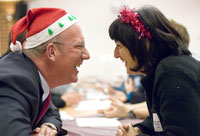
Professor Bob Allison, Pro-Vice-Chancellor for research and Professor Judy Sebba (Education) at the University's Research Christmas Stocking event
The year ended with the first ever Research Christmas Stocking event, attended by 250 academic staff looking for their perfect research partner. The University is offering four prizes of £4,000 each to the best collaborative research proposals that spring from the event.
Education, education, education
Education researchers at Sussex produced findings that could have a major impact on education policies. Professor Jo Boaler revealed that children in mixed ability mathematics classes outperformed those grouped by ability alone.
In a separate study, Dr Mairead Dunne led a project that analysed grouping practices and found that working-class pupils are more likely to be placed in lower sets than middle-class pupils who have the same test results.
Meanwhile, Carol Robinson asked primary school pupils what they thought about their schooling, and found that children found themselves under considerable pressure to perform well in national curriculum tests. They were also concerned about the loss of curriculum breadth as teachers concentrate more on the tested core subjects. The research formed part of the major Cambridge Primary Review.
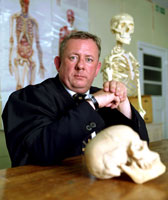
Creating debate: James Williams argued against creationism in the classroom on Radio 4
The debate over whether creationism should be taught in schools continued this year, with James Williams appearing on Radio 4's Today programme, pitted against Matthew Reiss of London's Institute of Education, about whether creationism should be taught in science lessons.
Future features
There's one certainty about the future - and that is that it's going to happen.
But what of the world in which we'll be living? Sussex Energy Group experts were called upon by the media throughout 2007 to comment on carbon footprints, renewable energy, and the efficiency/inefficiency of wind turbines. One story that was reported on so widely it practically created its own carbon footprint was research by Dr Tao Wang and Dr Jim Watson that nearly a quarter of China's carbon emissions are created by goods manufactured and exported to Western consumers.
From robots to reality literature, endangered wildlife to the obesity epidemic, leading academics from the University of Sussex explored 'Visions of our Future' at the Brighton Fringe Festival this year. Artificial intelligence expert Dr Blay Whitby gave a talk about the role of robots, Professor Erik Millstone weighed up the obesity epidemic and Professor Nicholas Royle gave predictions on the future of literature. Other talks included international relations Professor Ronen Palan on 'The state in the era of globalisation' and Professor Peter Kaufmann exploring the relationship between innovation and happiness.

Bright IDEAS: The Homework system could be in classrooms of the future
A new interactive learning system that helps parents keep in touch with what their children are doing at school is proving to be a great success with pupils, parents and teachers. The research - based at the IDEAS laboratory in the School of Science and Technology at the University of Sussex and the London Knowledge Lab and funded by the Economic and Social Research Council (ESRC) - involved the development of the HOMEWORK system.
And a device that will allow doctors to monitor patients' hearts without even touching them could also soon be used to test carbon composite aircraft parts and microchips for defects more accurately and easily, thanks to new research by the inventors, Dr Robert Prance, Dr Christopher Harland and Dr Helen Prance
Well done US
Students (past and present), academics and the University itself have notched up special honours, awards and achievements this year.
Professor J Michael Pendlebury Research Professor in Experimental Particle Physics in the University's department of Physics and Astronomy and Professor Keith Green, Visiting Senior Research Fellow at Sussex and Honorary Scientist at the Rutherford Appleton Laboratory, Oxfordshire were awarded the Chadwick medal and prize for distinguished research in particle physics in the Institute of Physics (IOP) 2008 awards. The IOP awards recognise a broad range of physicists in fields as diverse as biological physics, particle and astrophysics. Professors Pendlebury and Green were specifically honoured for their outstanding contributions to the measurement of the neutron electric dipole moment, and of other fundamental properties of the neutron. They will receive the award at a special ceremony in London on 24 January 2008.
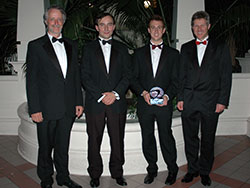
Sussex student Paul Skrzypczyk is awarded the SET Physics student of the year prize by Steve McQuillan, MD of award sponsor the National Physics Laboratory
Outstanding University of Sussex physics graduate Paul Skrzypczyk was named Physics Student of the Year in a national science competition. Paul, who this year earned a first-class Theoretical Physics MPhys degree at Sussex, was shortlisted for the prize with fellow Sussex physics undergraduate Robert Zietal.
Sussex climbed higher and Chemistry hits no 1 in the Guardian's university guide, while the THES-QS World University Rankings 2007, published in the Times Higher Education Supplement placed Sussex fifth in the UK for the impact of its research.
University of Sussex psychology graduate and British Olympic fencing hopeful Laurence Halsted won a bronze medal at the World Student Games in Bangkok Laurence, 23, took third place after finding his stride in the earlier heats, losing to eventual gold medallist Wu Hanxiong (China) in a closely-fought contest.
Two Sussex alumni made the final shortlist for the Man Booker Prize this year. Indra Sinha, a former Creative Writing Certificate student, joined celebrated author and Sussex English graduate Ian McEwan in the final shortlist for the prestigious publishing award.
Natural selection
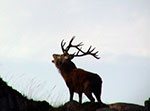
Female red deer prefer the roars of larger stags
The call of the wild - Sussex style - proved irresistible to the media, who made the most of research by doctoral student Ben Charlton and academics Dr David Reby and Dr Karen McComb into the mating calls of male red deer. According to the findings, big antlers aren't enough to attract the ladies - males need to sound impressive too.
Dr Reby's work with Dr Loic Hardouin on the behaviour of scops owls proved a hoot for headline writers, but the research also threw new light on the bluffing tactics employed by these nocturnal birds. Territorial males, the research found, work out who's who in the dark by associating lower pitched hoots with heavier males. Males defending territory were more likely to hoot - and hoot lower - to higher-pitched rivals who sounded like less of a threat.
Llamas were the unlikely stars of another research story, with the Today programme on Radio 4, the Telegraph and BBC Breakfast News all wanting to know how llama droppings helped Dr Mick Frogley, in the absence of written history, to chart the rise and fall of the Inca empire in Peru. Llamas were the primary form of transport for the ancient Incas. Analysis of the fossilised remains of mites that fed on llama droppings revealed tantalising clues about Inca trade, animal and population numbers around the time of the Spanish conquest. Similar techniques could now be used to help analyse global climate patterns.
Doctoral research by Tasha Sims into the wild boar population in Sussex revealed a little-known talent of these much-maligned yet shy creatures - their foraging habits help to preserve the habitat of Britain's best-loved flower, the bluebell. Brown-headed spider monkeys, meanwhile, played a part in research to save the Ecuadorian rainforest from a big copper mining scheme. Dr Mika Peck's work to help conserve the endangered monkey helped persuaded the local government to reject plans to mine the area.
The roles played by other flora and fauna in the great discoveries of science were also celebrated in a new book by Dr Jim Endersby. pays tribute to the fruit flies, guinea pigs and evening primroses, which A Guinea Pig's History of Biology advanced our understanding of mysteries such as genetics.
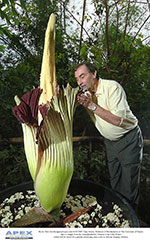
Professor Tony Moore savours the scent of the Titan Arum at the Eden Project
Professor Anthony Moore got on the scent of one of the world's largest - and smelliest - flowers when a Titan lily came into bloom at Cornwall's Eden Project. The flower - which blooms only once every seven years - releases an odour similar to rotting flesh when an enzyme in the plant causes the flower spike to heat up. The same enzyme is found in the parasite that cause African sleeping sickness, and in fungi and could yield properties of use to industry and medicine. Professor Moore, who is conducting research into the enzyme, even managed to deliver a series of public lectures standing next to the short-lived bloom without holding his nose.
The way we were

Student author Jenna Bailey with archive donor Rose Hacker
Letters and diaries held in the University library's Special Collections continued to fascinate, whether they focused on the lives of the famous or the unknown.
The writings of the desperate housewives who formed the Cooperative Correspondence Club formed the subject of a critically-acclaimed book by former MA student Jenna Bailey.
With support from Dorothy Sheridan and her Special Collections team, Jenna pieced together the background story of the Rose Hacker archive, part of the University's Special Collections catalogue. Can Any Mother Help Me? - a tale of isolated and frustrated women looking for an intellectual outlet in a world of stay-at-home housewives - turned Jenna's MA thesis into a top-selling book.
Victoria Wood's award-winning TV drama Housewife, 49, took as inspiration the diary of ordinary housewife Nella Last, whose writings now form part of the Mass Observation Archive. The archive, held in trust by the University, celebrated its 70th year at the 2007 Brighton Festival with readings from Simon Garfield's wartime diaries trilogy Our Hidden Lives, read by actors Greta Scacchi and Paul McGann.

Rudyard Kipling's soldier son Jack - a photo from the Kipling Archive in the University library
The letters of Rudyard Kipling and his soldier son - also held in Special Collections - formed the basis of another TV drama, My Boy Jack. Harry Potter star Daniel Radcliffe took the starring role of Jack, whose poignant last letter to Kipling noted the horrors of war at the Front, yet revealed a tender connection to his famously patriotic father.

The letter to King Edward I, found by CCE student Tony Voice
Detective work by students in the Centre for Continuing Education helped to crack the Medieval mystery of a Sussex church with no name. Husband-and-wife sleuths Tony and Lesley Voice discovered a letter written to Edward I while studying on a church archaeology course run by CCE. The scrap of vellum revealed that the church, in North Stoke near Arundel, was called St Mary's - a fact lost since the Reformation. The church was re-dedicated to its patron saint in a ceremony attended by the Duke of Gloucester and the Bishops of Arundel and Horsham. "It's a real-life Da Vinci Code story," said CCE church archaeology tutor Bob Hutchinson.
Further afield, CCE field archaeology student Diarmaid Walshe found himself in the Israeli media spotlight when he uncovered an impressive mosaic in a Byzantine villa at the historically important Yavneh-Yam site, near Tel Aviv. Mr Walshe, who was able to join the dig for four weeks thanks to a travel bursary from CCE, said it was a once in a lifetime discovery and a dream come true. The discovery also caused great excitement in the Israeli media, as the site is not officially protected and may be under threat from development.
A Sussex eye view
How we view ourselves and each other proved a rich subject for scrutiny for academics and students at Sussex.
Psychologist Dr Helga Dittmar's continuing research into body image tackled the controversial subject of the effect of pop videos on body-conscious adolescents. She said: "Female models in music videos help to promote thinness as desirable - and are often depicted in ways that emphasise this physical ideal. It is against this ideal that young girls come to measure themselves, often unfavourably."
Her research, published in the journal Body Image, discovered that after just ten minutes' exposure, subjects who watched music videos featuring thin, idealised models exhibited the greatest increase in body dissatisfaction. The findings also showed that girls with both high and low self-esteem were equally vulnerable to the negative impact of music videos on their body image.

Dr Dan Wright reported on how we view others in police ID parades
Fellow psychologist Dr Dan Wright reported on how we view others when it comes to police identity parades. His research recommended changes in procedure to ensure greater accuracy. Double-blind parades, said Dr Wright, where the person directing the parade is also unaware of the identity of the actual suspect, would prevent the witness being influenced in their choice by inadvertent non-verbal cues. He also recommended measuring the confidence of the witness over their choice of suspect immediately after the parade, but before the identification of the actual suspect is revealed, to ensure a more reliable result.
Media Practice and Theory students caught Brighton in the act when they featured the city in a film about the history of the Brighton dirty weekend. Kiss Me Quick, a short documentary film by Stella Sims, Adriano Majocchi, Indira Maya Ganesh and Mahmoud Muna, was shown at London's Raindance film festival and Brighton's SEE documentary film festival. Cultural commentators Andy Medhurst and Dr Claire Langhamer added a touch of academic gravitas to the goings-on.
Artistic gems
Media commentator Andy Medhurst was media commentated on himself with the publication of his new book, A National Joke. Andy, who was profiled by the Guardian, focused on some of his favourite comedians, comedic genres and gags of the 20th century in an attempt to unravel how comedy and Englishness are related.
As part of the Charleston Festival in May and to celebrate the 100th anniversary of Daphne du Maurier's birth, Sussex creative writing lecturer Dr Sue Roe chaired a discussion to examine the author's enduring appeal. Sue also saw her widely acclaimed biography, The Private Lives of the Impressionists, come out in paperback in 2007.
Another centenary celebrated by the English department this year was the birth of W H Auden. A one-day conferences was organised by literature and film studies lecturer Dr John David Rhodes to re-examine the poet's overlooked legacy.
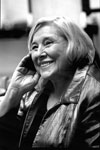
Fay Weldon was guest speaker at a University of Sussex conference on humour
Celebrated author and professor of creative writing Fay Weldon was the guest speaker at another University of Sussex conference aimed to encourage serious study of humour.
On the music front, the Royal Albert Hall reverberated to the powerful sounds of brass, percussion and around 100 musicians when Substratum, a new orchestral piece composed by University of Sussex music lecturer Dr Sam Hayden, was premiered at the BBC Proms this summer. Substratum (2004-2006) was commissioned by BBC Radio 3 and performed by the BBC Symphony Orchestra.